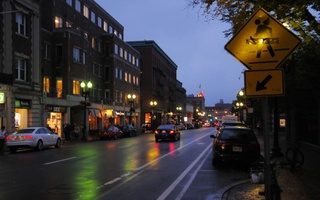What do traveling, architecture, and breakfast places all have in common? According to a popular website, they are all “stuff white people like.” Immediately, this assertion seems to both make sense and make no sense at all. Certainly there are many white people who enjoy these things, and someone you know who is white may have a passion for one item in particular. It is possible to run through the entire list, with over 100 items, and think of a white person who likes each thing, from pea coats (#111), the Ivy League (#98), to even bottles of water (#76). However, although this blog’s main purpose is humor, its homogenizing of white people and conflation of whiteness with affluence creates negative stereotypes and adds baseless connotations to widely done activities.
Some of the site’s listings, which have now been compiled into two books, obviously have little to do with only white people—such as San Francisco (#91) and divorce (#66). Many others, however, skew the perception of white people’s likes toward activities for the well off and successful. Things like graduate school (#81), living by the water (#51), and expensive sandwiches (#63) denote both resources and academic success. This does not mean that there are not many white people who do like these things, but labeling them as “white” things subtly makes them objects and activities that other races do not like. This past year, two of my African-American friends studied abroad, which is number 72 on the list, does that make them more white? Are they less African-American or black because they took part in or liked this activity? Built in to every item on this list lies not only the assertion of enjoyment by white people but also a dislike or less of an enjoyment by other races.
The defining characteristic of this blog is the differentiation of white people’s likes with other’s likes, as all definitions require separation from something else to exist. From this lens, this list states that other races enjoy the World Cup (#133), Bob Marley (#125), and free healthcare (#94) less than white people do. While this is not equivalent to outright racial slurs, the site’s indirect negative treatment of other races has a discriminatory effect.
The website and its spinoffs are, in fact, flawed and failed attempts at creating a unified “white culture.” While it is true that two people may describe themselves as white on a survey or job application, the unity that this characteristic holds is tiny. In the same way that thinking someone from the Gambia is the same as someone from Kenya, or that someone from Singapore is the same as someone from Vietnam, combining Americans of European descent together does more to ignore and cover culture than create it. Saying that white people like natural medicine (#59), for example, blocks out cultural differences among Italians and the Irish on this issue, providing a single unverified and ignorant claim.
Of course, Stuff White People Like is merely a website and two books, but perhaps the most troubling thing about it is the relatively benign status it maintains. Although packaged as a fun list, this type of social commentary reduces an entire race to an arbitrary and expensive set of activities, distances other races from academic and financial success, and neglects actual culture. It is the very sort of thing that most white people hate.
Marcel E. Moran ’11, a former Crimson associate editorial editor, is a human evolutionary biology concentrator in Eliot House.
Read more in Opinion
Not For Sale















